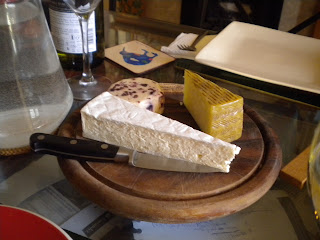The
book
Chapter 22 of Moby Dick by Herman Melville
is titled Merry Christmas and is one of the most touching ones, because
drenched into a deep sadness, sarcasm and true sense of belonging to the ship
community. Captain Ahab does not show up on the deck. Captain Bildad and
Captain Peleg are licensed at the end of the chapter and they take a boat
to move ashore, while tears twinkle in their eyes and voices. Ismaele, the
narrating voice, remembers:
“At last the anchor was up, the sails were set, and off we glided. It was
a short, cold Christmas; and as the short northern day merged into night, we
found ourselves almost broad upon the wintry ocean, whose freezing spray cased
us in ice, as in polished armor. The long rows of teeth on the bulwarks
glistened in the moonlight; and like the white ivory tusks of some huge
elephant, vast curving icicles depended from the bows”.
Bildad, while at the wheel, intonates what
sounds like a Psalm, but is a ballad by Isaac Watts, A prospect of Heaven makes Death easy. The winds bring his words to
the crew: the first line quoted by Melville says “sweet fields beyond the
swelling floods”, which portraits the stated on peril the ship is going to
undergo now that Bildad and Peleg won’t tame anymore Captain Ahab.
How different my yesterday Christmas was? Let's have a glance:
 |
| Moby Brie-k: I could not restrain myself, but I apologise. |
The
people
Not many people stayed in Edinburgh for Christmas.
So, I decided to create a Doodle to see if those here, were interested in a
Christmas’ lunch. What happened was pure magic: only a person, a dear good
friend of mine, Andrew, responded to the invitation. He involved and brought
along two exceptionally nice friends, who I didn’t have the pleasure to met.
Stephanie and Emily proved to be fascinating guests: elegant, nice and
talkative. My brilliant office-mate Mara came just after the opening with her
brother and her sister-in-law and that was it. Everything would have been magnificent if only Michelle was there with us! Alas, the sun blessed us casting a
bunch of rays onto the Leopard Lily (I still have a to find a name for it):
 |
| Leopard Lily in the gentle December sun |
This has been the first Christmas away from my family: a strange feeling to process. Yet I must tell the novelty was not just
surprising, but indeed a revelation. Perhaps because everyone was new to each other, the
conversation was lubricated, alive and fizzy. The reduced number of guests made
everything easier (also in terms of dish cleaning). We were three Italians, three
Germans and one Australian: this milieu favoured the use of English as conversational
language and we were occasionally switching to German or Italian when needed. This
“natural” selection of outstanding guests was the first step in order achieve
the perfect event.
The
place
Perhaps, the purple tents, perhaps a
serious Christmas three, perhaps the red dishes with the white rime – after which
this blog is named – made of my flat the perfect location to appoint. We
discovered that in Australia every fancy meal might be called dinner. Recently, I attended a tea in
Edinburgh, yet the tea, in reality,
was a full-scale dinner. I am
particularly amused by this regional acceptation given to meals in the
English-speaking-world!
 |
| Our synthetic Christmas tree makes a lot of atmosphere, the spirit of all the possible Christmas dwells here. |
The
food
As soon as the crew was elected, it was
necessary to establish a menu. Everyone was asked to contribute to the meal
according to her/his culinary skills. This is why Andrew opted for two platters
of mixed salami and one international cheese, so to prevent himself from
poisoning us. Stephanie brought with her a splendidly revised recipe of Tiramisu
and Emily an extraordinary Lamington cake,
introducing us to the sweet delicacies of the Austral hemisphere. I basically made a broth. I also discovered that the stock is derived from bones, broth instead from meat:
Yet here is
the complete and exhaustive (and exhausting) menu:
Starters
· Tesco Finest* platter of ham, salami and three cheeses (Brie, Mancego, Wanslaydale with cranberries);
· Duck titbits with dates, rolled in pancetta and served with steamed asparagus' tips.
Main course
· Tortellini in duck broth.
Second course & side dishes
·
Duck salad with Modena balsamic
vinegar gravy reduction
·
Roasted potatoes with mustard
seeds and rosemary
·
Salad (apple, lettuce gems, rocket salad, celery, sweet pointed peppers)
Desserts
·
Tiramisu and Lamington cake
·
Green and Blacks chocolate assorment
· Twinings nettle and sweet fennel infusion
 |
| Deli platter |
 |
| The cheeses |
 |
| Steamed asparagus and sprouts with morsels of duck thighs' meat, dates and pancetta |
 |
| Clockwise: from the left, the duck breast with the balsamic gravy, mustard seeds and rosemary roasted potatoes, and the extravagant salad, dressed in lemon and extra-virgin olive oil. |
 |
| Lamington cake (pic taken from Google images): admittedly they were irresistible! |
 |
| Stephanie's tiramisu was looking different, but the taste was an A. |
The
wine
Wines have been a genuine crescendo of tannins
and joy: a French Tesco Finest* Muscadet
for the appetizers, an Ogio’s Primitivo from Puglia and The chocolate lover’s wine, aromatised with chocolate notes, a
symphony: this wine is sold in Sainsbury’s and Co-operative.
 |
| Muscadet Sèvre et Maine sur Lie, Tesco Finest* 7,27£. Produced and bottled by Vignerons du Pallet in Brétagne, France. |

The
games
When all the food was gone, Mara had to
leave, and Stephanie proposed us to play Pictionary. Not the table version, but
the online generator of words and categories. This was hilarious, challenging
and cheerful.
 |
| Pictionary word generator: |












































